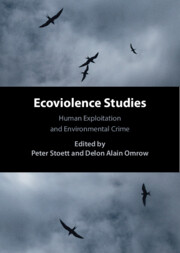Book contents
- Ecoviolence Studies
- Ecoviolence Studies
- Copyright page
- Contents
- Contributors
- Foreword
- Foreword
- Preface and Acknowledgments
- 1 Ecoviolence Studies and Human Security
- 2 The Links between Human Trafficking and Wildlife Trafficking
- 3 Preventing a Secondary Disaster: How Emergency Management Agencies Can Prepare and Respond to Disaster-Linked Exploitation
- 4 Ecoviolence at Sea
- 5 There Will Be Blood: The Return of the Frontier Logic in Guyana and Hyper-Exploitation in the Mining Sector
- 6 Artisanal Gold Mining in Uganda: Towards Formalization as Remediation of Dignity and Rights
- 7 Searching for Shelter in the Climate Crisis Era: Ecocide and Migration
- 8 Climate Change, Violence and Ecocide
- 9 Sea of Cortez Region: Crime and Ecosystem Crossroads
- 10 Minority Languages as Collateral Damage in the Climate Crisis: The Incidental Result of Ecoviolence on Y Gymraeg/Welsh Language
- Index
- References
4 - Ecoviolence at Sea
Published online by Cambridge University Press: 13 February 2025
- Ecoviolence Studies
- Ecoviolence Studies
- Copyright page
- Contents
- Contributors
- Foreword
- Foreword
- Preface and Acknowledgments
- 1 Ecoviolence Studies and Human Security
- 2 The Links between Human Trafficking and Wildlife Trafficking
- 3 Preventing a Secondary Disaster: How Emergency Management Agencies Can Prepare and Respond to Disaster-Linked Exploitation
- 4 Ecoviolence at Sea
- 5 There Will Be Blood: The Return of the Frontier Logic in Guyana and Hyper-Exploitation in the Mining Sector
- 6 Artisanal Gold Mining in Uganda: Towards Formalization as Remediation of Dignity and Rights
- 7 Searching for Shelter in the Climate Crisis Era: Ecocide and Migration
- 8 Climate Change, Violence and Ecocide
- 9 Sea of Cortez Region: Crime and Ecosystem Crossroads
- 10 Minority Languages as Collateral Damage in the Climate Crisis: The Incidental Result of Ecoviolence on Y Gymraeg/Welsh Language
- Index
- References
Summary
Global fisheries have been described as being in a state of crisis, characterized by declining global catches, overfishing and collapse of important fish stocks. Following this, the policy debates have been centered around the concept of “sustainable fisheries.” Initially, this debate focused on how to ensure sustainable fisheries from an environmental perspective and how to overcome existing problems with overfishing, while at the same time, ensuring profitability, jobs, livelihood opportunities as well as responding to the increasing concerns over illegal, unregulated and unreported (IUU) fishing practices. This chapter provides a systematic review of the emerging literature on labor-related problems in the fishing sector, and provides a detailed account of the main steps taken in recent years by one select private governance approach, the community of practice surrounding FIPs, to more effectively address the violence behind labor-related concerns.
Keywords
- Type
- Chapter
- Information
- Ecoviolence StudiesHuman Exploitation and Environmental Crime, pp. 56 - 85Publisher: Cambridge University PressPrint publication year: 2025

